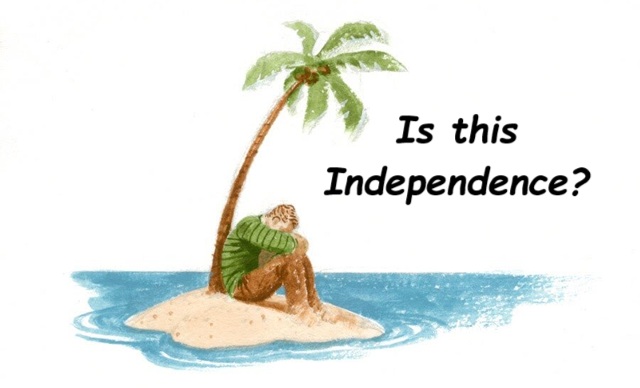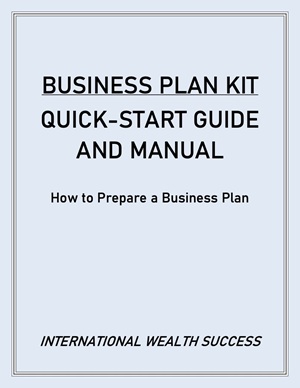Is Independence Important?
So, why independence indeed?
What is it about independence that makes it so important? Why does everyone seem to feel that independence is a good thing? Aren’t we better off when we can depend on other people to help meet our needs, to keep us safe, and to guarantee our happiness?
In this chapter, we’re going to examine the concept of independence. We’ll define what independence is. We’ll look at the reasons why independence is important. We’ll see that group reliance is a good thing, except when taken too far. We’ll see that a healthy amount of self-reliance is a necessary bulwark against becoming too dependent on others. At the end of the chapter, you will be armed with enough information to answer the question posed in the chapter title in a way that makes sense to you.
What is Independence?
The very definition of the word “independence” telegraphs the ambiguity of the concept. Independence is defined as “the fact or state of being independent”. As we just said, there’s not a lot there that’s helpful.
So, it would seem that the next step is to define the word “independent”. Here, things get a little more interesting. Independent has two separate definitions, both of interest to our purposes. The first definition of independent is “free from outside control; not depending on another’s authority”.
Let’s take a moment to unpack that definition.
Obviously, freedom is a critical component in the understanding of the concept of independence. However, freedom, or independence, means nothing unless it is capable of being contrasted with its opposite – control. In other words, you can only measure your freedom against the amount of control that someone else has over your actions. It is a little bit like the situation that exists with the idea of light and dark. The only way to accurately describe light is the absence of darkness. The more darkness there is, the less bright the light becomes.
In this way, independence itself can only be described as the absence of control. The less control there is, the more independence grows. As control grows, independence slowly becomes eclipsed. Therefore, it can be seen that independence is very much a zero-sum game. You can only increase your personal independence by diminishing someone else’s control over your actions. Likewise, your ability to act freely shrinks when someone’s control over you increases. The two concepts exist in constant tension, always in opposition to each other and, ironically, each dependent on the other for their very existence.
It should be noted, that this inherent tension means that there is no such thing as absolute independence. Total freedom is a myth, as is total control. No matter how independent your lifestyle is, you will still experience some form of control over your actions. For example, an individual who has decided to opt out of society and live “off the grid” still experiences a degree of control from that society. No matter how far they remove themselves physically or socially from the society that surrounds them, they will still feel its effects. The laws of that jurisdiction still have the power to delimit behavior when they are enforced. The economy of the society still controls buying choices through availability. Technology has the same effect.
In the same way, the physical laws of nature also constrain independence. The body requires sustenance and hydration. Fatigue will always follow physical exertion. Gravity is an inexorable arbiter of the ability to fly. In short, not only do the laws of man constrain total independence, but the laws of nature do likewise. Does this mean that the concept of independence is fundamentally flawed?
Nothing could be further from the truth.
We have seen that independence is a concept that depends on its exact opposite to have any meaning. This fact gives us a clue into the true nature of what it means to be independent. You see, to understand independence, you have to understand interdependence. While at first glance, the dynamic between independence seems black and white, the truth is quite different. The definition of independence is not found at the extremes of freedom and authority. Instead, it is found in the nuanced areas of gray that exist between these two poles.
John Donne once famously said that “no man is an island”. When it comes to defining independence, truer words have never been spoken. It is an indisputable fact that our degree of independence depends upon our degree of dependence.
As we have seen, we will never experience total freedom. The world and the cosmos that it exists in are simply not constructed that way. By the same token, we will never experience total control. In the most totalitarian governments that have ever existed, people still found ways to express independence and individuality. No dictator could control the thoughts of the people under him. No tyrant could stop people from forming opinions. If total independence is a myth, then total authority is also a myth.
This means that true personal independence is a balance between personal freedom and the obligation to act in certain ways when it comes to our fellow human beings. Any society depends on an implicit agreement among all of its members when it comes to behavior. The ability of one person to act in a certain way is delimited by the needs or desires of the other members of that society. It is this agreement that truly defines independence.
You can live on your own terms. However, those terms can never harm or impinge upon the ability of others to also live their lives on their terms. In a strange sense, independence is about cooperation with and mutual respect for our neighbors. Your personal freedom is guaranteed by their assent for that freedom. Their personal freedoms are likewise guaranteed by your assent.
Our mutual interdependence is the foundation and basis for any one example of individual independence.
Next Chapter >>>>>>
Is this getting too deep in the weeds?
I would really appreciate your input or sharing of personal experiences on these points












Brilliantly explained! Excited for the next chapter. I’m wondering how emotional maturity ties into independence.
Thank you Amy for you following and comment. Yes, Emotional Maturity is an important element in gaining Independence.
A few ideas along this idea were presented here. Getting a Grip on Self Doubt